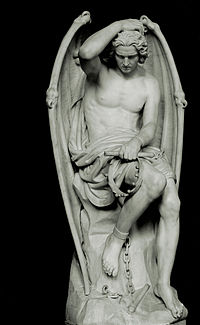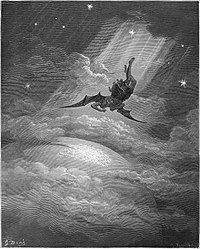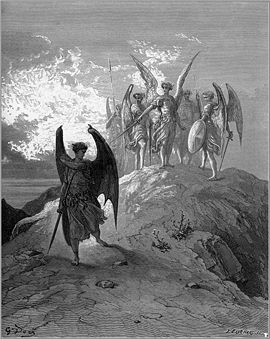Lucifer: Difference between revisions
| [pending revision] | [pending revision] |
Jasonasosa (talk | contribs) m →Christianity: BC |
→Christianity: Correcting BC to AD. |
||
| Line 49: | Line 49: | ||
===Christianity=== |
===Christianity=== |
||
In Christian tradition, Lucifer is identified with Satan,<ref>{{cite book|last=Winn|first=Shan M.M.|title=Heaven, heroes, and happiness : the Indo-European roots of Western ideology.|year=1995|publisher=University press of America|location=Lanham, Md.|isbn=0819198609|page=202}}</ref> The Latin word ''lucifer'' was applied to ''Satan'' by the Church fathers of the 3rd century |
In Christian tradition, Lucifer is identified with Satan,<ref>{{cite book|last=Winn|first=Shan M.M.|title=Heaven, heroes, and happiness : the Indo-European roots of Western ideology.|year=1995|publisher=University press of America|location=Lanham, Md.|isbn=0819198609|page=202}}</ref> The Latin word ''lucifer'' was applied to ''Satan'' by the Church fathers of the 3rd century AD. Such association is seen in the writings of [[Origen]] (''Homilies on Ezekiel'' 13),<ref>{{Cite book| last = Russell | first = Jeffrey | title = Satan | publisher = [[Cornell University Press]] | location = Ithaca | year = 1981 | isbn = 0-8014-9413-3 }}{{Page needed|date=September 2010}} "A great deal of the vivid elaboration of legend and literature on the Devil's nature arises from Origen's initiative in using these texts.61 The angels fell in the beginning along with Satan, and for the same reason, pride."</ref> [[Tertullian]] ("Contra Marcionem," v. 11, 17), and [[Augustine of Hippo]].<ref name="Tyndale"/><ref>[http://www.shasta.edu/admin/userfiles/resourceDocuments/ggunn_Isa14v12-16.pdf G. Gunn, "The Speaker of the Five 'I Wills', Isaiah 14:12-16"], p. 12, citing Marvin E. Tate, "Satan in the Old Testament", ''[[Review & Expositor]]'' 89 (Louisville, KY: Review and Expositor, 1992), 467.</ref><ref>[http://books.google.com/bookshl=en&lr=&id=i_AcX5Znv6cC&oi=fnd&pg=PA9&dq=lucifer&ots=AgpHsjMK4_&sig=S5Jjgg62r_ZMsow0IKs8ySv-9_U#v=onepage&q=origen%20treated&f=false Jeffrey Burton Russell, ''Lucifer, the Devil in the Middle Ages'' (Cornell University Press 1988 ISBN 978-0-8014-9429-1), pp. 11-12]</ref> The word ''lucifer'' was never used in Latin as a [[proper name]], as it was in English. |
||
The passage of Isaiah 14:12-15 came to be applied to Satan, in the role of being the "[[fallen angel]]". The association of Satan being a [[fallen angel]] was greatly influenced by 1st century BC Jewish [[Pseudepigraph|pseudepigrapha]] such as ''[[Life of Adam and Eve]]'' and the ''[[Second Book of Enoch]]''.<ref>Verses 29:4, 31:4 of the longer recension manuscript R. "The Lucifer myth was transferred to Satan in the pre-Christian century, as may be learned from 'Vita Adæ et Evæ' (12) and Slavonic Enoch (xxix. 4, xxxi. 4)" – ''[[Jewish Encyclopedia]]'' [http://www.jewishencyclopedia.com/view.jsp?artid=612&letter=L article ''Lucifer'']</ref> |
The passage of Isaiah 14:12-15 came to be applied to Satan, in the role of being the "[[fallen angel]]". The association of Satan being a [[fallen angel]] was greatly influenced by 1st century BC Jewish [[Pseudepigraph|pseudepigrapha]] such as ''[[Life of Adam and Eve]]'' and the ''[[Second Book of Enoch]]''.<ref>Verses 29:4, 31:4 of the longer recension manuscript R. "The Lucifer myth was transferred to Satan in the pre-Christian century, as may be learned from 'Vita Adæ et Evæ' (12) and Slavonic Enoch (xxix. 4, xxxi. 4)" – ''[[Jewish Encyclopedia]]'' [http://www.jewishencyclopedia.com/view.jsp?artid=612&letter=L article ''Lucifer'']</ref> |
||
Revision as of 18:51, 28 June 2012

Lucifer (/[invalid input: 'icon']ˈluːsɪfər/ or /ljuːsɪfər/, loo 'si-fuhr; Hebrew: הֵילֵל, hēlēl,[1] "shining one" (H2122);[2] Greek: Ἑωσφόρος, Heosphoros, "dawn-bearer"; Latin adj.,[3] lucem ferre, "light-bringing") is the KJV rendering of the Hebrew word hēlēl. The use of lucifer for helel occurs only once in the Hebrew Bible in Isaiah 14:12. The name originates from the Vulgate (Latin lucifer, "light-bringing") and is applied to the morning star, Venus seen at dawn. In Christianity, the term was then applied to Satan.[4][5][6]After the name "Lucifer" became synonymous with the Devil, its use outside of the Bible was popularized in works such as Dante Alighieri's Inferno and John Milton's Paradise Lost.
Lucifer in Latin
In Latin, the word (n.) lucifer means "light-bearer" equivalent to the Greek term phosphoros. Phosphoros is also a name for the morning star, Venus when seen at dawn.
- stella Veneris, quae Φωσφόρος Graece Lucifer Latine dicitur cum antegreditur solem, cum subsequitur autem Ἕσπερος (De Natura Deorum)
- "The star of Venus, called in Greek Phosphoros (the light-bringer) and in Latin, lucifer when it precedes the sun, but when it follows it Hesperos."[7]
The Vulgate uses the word "lucifer" (with lower-case initial) twice to refer to the Morning Star: once in 2 Peter 1:19 to translate the Greek word φωσφόρος (phōsphoros), a word, from φῶς (phōs) meaning "light" and φέρω (pherō) meaning "to carry", that has the same meaning of Light-Bringer that the Latin word has, and once in Isaiah 14:12 to translate the Hebrew word הילל (Hêlēl).[8] In the Septuagint, the Greek word used in Isaiah 14:12 is Ἑωσφόρος (Heosphoros, "dawn-bearer"),[9][10][11] not φωσφόρος, the etymological synonym of Latin lucifer,[12][13] used in 2 Peter 1:19 of the morning star.
The Vulgate translation uses "lucifer" (Morning Star) twice to translate words in the Book of Job that meant something different: once to represent the word "בקר"[14] (which instead means "morning") in Job 11:17, and once for the word "מזרות" (usually taken to mean "the constellations") in Job 38:32. The same Latin word appears also in the Vulgate version of Psalms 110:3, where the original has "שׁחר" (dawn, the same word as in Isaiah 14:12).
The Vulgate did not use the Latin word lucifer to represent the two references to the Morning Star in the Book of Revelation. In both cases the original Greek text uses a circumlocution instead of the single word "φωσφόρος", and a corresponding circumlocution is used in the Latin. Thus "stella matutina" is used for "ὁ ἀστὴρ ὁ πρωϊνός" in Revelation 2:28, which promises the Morning Star to those who persevere, and for "ὁ ἀστὴρ ὁ πρωϊνός" (or, according to some manuscripts, "ὁ ἀστὴρ ὁ ὀρθρινός") in Revelation 22:16, where Jesus calls himself "the bright morning star".
The English word "Lucifer" is used in none of these places (other than Isaiah 14:12), where the Latin translation uses the Latin word "lucifer" (i.e., morning star).
As a title for Christ, the Latin word lucifer is still used in the Exsultet hymn sung during the Easter Vigil in the Roman Rite.
Hebrew Bible
In Isaiah 14:3-5, 12-15, the prophet Isaiah promises that the Israelites will be free from their Babylonian captivity and will be able to use, in a taunting song against their oppressor, the image of the morning star. The phrase "O star of the morning, son of the dawn" in verse 12 translates the Hebrew [ הילל בן־שׁחר Helel Ben-Shachar] Error: {{Lang}}: text has italic markup (help).
The Septuagint renders the phrase as ὁ ἑωσφόρος ὁ πρωὶ ἀνατέλλων "the early-rising Eosphorus". Jerome follows this in his Latin Vulgate text, translating lucifer qui mane oriebaris ("morning star that used to rise early"). Most modern English versions (including the NIV, RSV, NRSV, NASB, NABRE, NJB and ESV) render the Hebrew word as "day star", "morning star" or something similar, and never as "Lucifer", a word that in English is now very rarely used in the sense of the original word in Hebrew (Morning Star), though in Latin lucifer was a literal translation.
A passage quite similar to that in Isaiah is found in Ezekiel 28:1–19, which is expressly directed against the king of Tyre, a city on an island that had grown rich by trade, factors alluded to in the text.[15] In Christian tradition, it too has been applied to Lucifer, because of some of the expressions contained in it.[16] But, since it does not contain the image of the Morning Star, discussion of it belongs rather to the article on Satan than to that on Lucifer.
Morning Star

In ancient Canaanite mythology, the morning star is pictured as a god, Athtar, who attempts to rule the throne of Ba'al. However, he was forced to descend and rule the underworld.[17][18] In Jewish sources, this myth only exists in fragmentary form, primarily in Isaiah 14:12 and 2 Enoch.[6]
The morning star is associated with the planet Venus, an inferior planet, meaning that its orbit lies between the orbit of the Earth and the Sun. It can never rise high in the sky at night as seen from Earth. Depending on the orbital locations of both Venus and Earth, it can be seen in the eastern morning sky for an hour or so before the Sun rises, or in the western evening sky for an hour or so after the Sun sets, but never during the dark of midnight. It is the brightest object in the sky after the Sun and the Moon. As bright and as brilliant as it is, ancient people did not understand why they could not see it at midnight like the outer planets, or during midday, like the Sun and Moon. It outshines the planets Saturn and Jupiter, which do last all night, but it soon disappears. As in the Canaanite story, the Morning Star tried to rise high above the clouds and establish himself on the mountain where the gods assembled, in the far north, but was cast down into the underworld.[19][20]
As the Latin poets personified the Morning Star and the Dawn (Aurora), as well as the Sun and the Moon and other heavenly bodies, so in Canaanite mythology, Morning Star and Dawn were pictured as two deities, the former being the son of the latter. Isaiah 12–15 seem to be based on a Phoenician model with the Ras-Shamra poems: Daystar and Dawn were two divinities; the "mount of Assembly" was where the gods used to meet, like Mount Olympus in Greek mythology.[21]
Belief systems

Judaism
Rabbinic exegesis of Isaiah 14:12-15 identifies הֵילֵל (heylel),[1] the "shining one", "morning star", with Nebuchadnezzar, who proposed after destroying Jerusalem, I will make war with the exalted holy ones and will set my royal throne over the cherubim.[22]
Christianity
In Christian tradition, Lucifer is identified with Satan,[23] The Latin word lucifer was applied to Satan by the Church fathers of the 3rd century AD. Such association is seen in the writings of Origen (Homilies on Ezekiel 13),[24] Tertullian ("Contra Marcionem," v. 11, 17), and Augustine of Hippo.[20][25][26] The word lucifer was never used in Latin as a proper name, as it was in English.
The passage of Isaiah 14:12-15 came to be applied to Satan, in the role of being the "fallen angel". The association of Satan being a fallen angel was greatly influenced by 1st century BC Jewish pseudepigrapha such as Life of Adam and Eve and the Second Book of Enoch.[27] Similar terminology is found in the Book of Ezekiel to describe the king of Tyre in Ezekiel 28:11–19 and is used to associate the fall of Lucifer. Luke 18:10 has been used by Christians to link Satan of the New Testament also to the fall of Lucifer: I saw Satan fall like lightening from heaven.[6]
Islam
In Islam, the Mohammedan account of Iblis follows the Lucifer motif of a leading angel turned devil. As Tabari and others relate, Iblis was in charge over things between heaven and earth, as the treasurer of the garden of Eden. Contrary to Christian belief, this prominent angel could never rebel or think to dethrone God. However, having been disobedient, Iblis is turned into a 'stoned devil' by refusing to worship Adam. Thus he sins after the creation of man. Iblis then swears an oath of revenge.[28]
Occultism

In the modern occultism of Dolores North (alias Madeline Montalban),[30] Lucifer's identification as the Morning Star (Venus) equates him with Lumiel, whom she regarded as the Archangel of Light, and among Satanists he is seen as the "Torch of Baphomet" and Azazel.
In the Satanic Bible of 1969, Lucifer is acknowledged as one of the Four Crown Princes of Hell, particularly that of the East. Lord of the Air, Lucifer has been named "Bringer of Light, the Morning Star, Intellectualism, Enlightenment."
Author Michael W. Ford has written on Lucifer as a "mask" of the Adversary, a motivator and illuminating force of the mind and subconscious.[31]
Luciferianism is a belief system that venerates the essential characteristics that are affixed to Lucifer. The tradition, influenced by Gnosticism, usually reveres Lucifer not as the Devil, but as a liberator or guiding spirit[32] or even the true god as opposed to Jehovah.[33]
Taxil's hoax
Léo Taxil (1854–1907) claimed that Freemasonry is associated with worshipping Lucifer. In what is known as the Taxil hoax, he claimed that supposedly leading Freemason Albert Pike had addressed "The 23 Supreme Confederated Councils of the world" (an invention of Taxil), instructing them that Lucifer was God, and was in opposition to the evil god Adonai. Apologists of Freemasonry contend that, when Albert Pike and other Masonic scholars spoke about the "Luciferian path," or the "energies of Lucifer," they were referring to the Morning Star, the light bearer,[34] the search for light; the very antithesis of dark, satanic evil. Taxil promoted a book by Diana Vaughan (actually written by himself, as he later confessed publicly)[35] that purported to reveal a highly secret ruling body called the Palladium, which controlled the organization and had a Satanic agenda. As described by Freemasonry Disclosed in 1897:
- With frightening cynicism, the miserable person we shall not name here [Taxil] declared before an assembly especially convened for him that for twelve years he had prepared and carried out to the end the most sacrilegious of hoaxes. We have always been careful to publish special articles concerning Palladism and Diana Vaughan. We are now giving in this issue a complete list of these articles, which can now be considered as not having existed.[36]
Taxil's work and Pike's address continue to be quoted by anti-masonic groups.[37]
In Devil-Worship in France, Arthur Edward Waite compared Taxil's work to what today we would call a tabloid story, replete with logical and factual inconsistencies.
See also "Lucifer and Satan" at the Grand Lodge of British Columbia and Yukon website.
Gallery
-
Lucifer, by Alessandro Vellutello (1534), for Dante's Inferno, canto 34
-
Lucifer, by William Blake, for Dante's Inferno, canto 34
-
cover of 1887 edition of Mario Rapisardi's poem Lucifero
-
Lucifer before the Lord, by Mihály Zichy (19th century)
-
Gustave Dore, illustration to Paradise Lost, book IX, 179–187
-
Mayor Hall and Lucifer, by an unknown artist (1870)
-
The planet Venus, either as the "Morning Star" (in Latin, Lucifer) or as the Evening Star (in Latin, Hesperus)
See also
- Lucifer in popular culture
- Luceafăr
- Earendel
- Eosphoros
- Inferno (Dante), the first of the three canticas of Divine Comedy
Footnotes
- ^ a b Strong's Number H1966
- ^ Zondervan Illustrated Bible Dictionary 2011, p. 862
- ^ Lewis, C.T. (1918). Hugh Macmaster Kingery (ed.). An Elementary Latin Dictionary, lūcifer. American Book Company. p. 479.
{{cite book}}: More than one of|author=and|last=specified (help) - ^ Zondervan Illustrated Bible Dictionary 2011, p. 863
- ^ Winn, Shan M.M. (1995). Heaven, heroes, and happiness : the Indo-European roots of Western ideology. Lanham, Md.: University press of America. p. 202. ISBN 0819198609.
- ^ a b c Schwartz 2004, p. 108
- ^ English translation by H. Rackham, in the Loeb Classical Library
- ^ In the Greek translation of this passage the word used is Ἑωσφόρος – from ἔως, meaning dawn – which literally means Dawn-Bringer.
- ^ Septuagint Book of Isaiah
- ^ Isaiah 14 LXX
- ^ "Lucifer" in Isaiah 14:12-17
- ^ ScriptureText.com
- ^ φωσφόρος Etymonline.com
- ^ Hebrew text
- ^ Your heart is proud and you have said, "I am a god; I sit in the seat of the gods, in the heart of the seas" … By your great wisdom in trade you have increased your wealth, and your heart has become proud in your wealth (verses 2 and 5)
- ^ With an anointed cherub as guardian I placed you; you were on the holy mountain of God; you walked among the stones of fire. You were blameless in your ways from the day that you were created, until iniquity was found in you. In the abundance of your trade you were filled with violence, and you sinned; so I cast you as a profane thing from the mountain of God, and the guardian cherub drove you out from among the stones of fire (verses 14–16).
- ^ John Day, Yahweh and the gods and goddesses of Canaan (Continuum International Publishing Group, 2002 ISBN 0-8264-6830-6, ISBN 978-0-8264-6830-7), pp. 172–173
- ^ Gregory A. Boyd, God at War: The Bible & Spiritual Conflict (InterVarsity Press, 1997 ISBN 0-8308-1885-5, ISBN 978-0-8308-1885-3), pp. 159–160
- ^ Jewish Encyclopedia: article Lucifer
- ^ a b Tyndale Bible Dictionary (Carol Stream, Illinois 2001 ISBN 978-1-4143-1945-2), article Lucifer (p. 829)
- ^ New Jerusalem Bible Isaiah 14:12 footnote
- ^ Breslauer, edited by S. Daniel (1997). The seductiveness of Jewish myth : challenge or response?. Albany: State University of New York Press. p. 280. ISBN 0791436020.
{{cite book}}:|first=has generic name (help) - ^ Winn, Shan M.M. (1995). Heaven, heroes, and happiness : the Indo-European roots of Western ideology. Lanham, Md.: University press of America. p. 202. ISBN 0819198609.
- ^ Russell, Jeffrey (1981). Satan. Ithaca: Cornell University Press. ISBN 0-8014-9413-3.[page needed] "A great deal of the vivid elaboration of legend and literature on the Devil's nature arises from Origen's initiative in using these texts.61 The angels fell in the beginning along with Satan, and for the same reason, pride."
- ^ G. Gunn, "The Speaker of the Five 'I Wills', Isaiah 14:12-16", p. 12, citing Marvin E. Tate, "Satan in the Old Testament", Review & Expositor 89 (Louisville, KY: Review and Expositor, 1992), 467.
- ^ Jeffrey Burton Russell, Lucifer, the Devil in the Middle Ages (Cornell University Press 1988 ISBN 978-0-8014-9429-1), pp. 11-12
- ^ Verses 29:4, 31:4 of the longer recension manuscript R. "The Lucifer myth was transferred to Satan in the pre-Christian century, as may be learned from 'Vita Adæ et Evæ' (12) and Slavonic Enoch (xxix. 4, xxxi. 4)" – Jewish Encyclopedia article Lucifer
- ^ Jung & 2004 Reprint, p. 34, 35
- ^ Alternative Religions
- ^ Madeline Montalban and the Order of the Morning Star
- ^ The Bible of the Adversary "Adversarial Doctrine" page 8 – Bible of the Adversary, Succubus Productions 2007).
- ^ Michelle Belanger (2007). Vampires in Their Own Words: An Anthology of Vampire Voices. Llewellyn Worldwide. p. 175. ISBN 0-7387-1220-5.
- ^ Spence, L. (1993). An Encyclopedia of Occultism. Carol Publishing.
- ^ "Lucifer, the Son of the Morning! Is it he who bears the Light, and with its splendors intolerable blinds feeble, sensual, or selfish Souls? Doubt it not!" (Albert Pike, Morals and Dogma, p. 321). Much has been made of this quote (Masonic information: Lucifer).
- ^ Leo Taxil's confession
- ^ Freemasonry Disclosed April 1897
- ^ "Leo Taxil: The tale of the Pope and the Pornographer". Retrieved 14 September 2006.
References
- Zondervan Illustrated Bible Dictionary, [edited by] J.D. Douglas. ([Rev. ed.], 2011 ed.). Grand Rapids, Mich.: Zondervan. ISBN 0310229839.
{{cite book}}:|first=has generic name (help); Invalid|ref=harv(help); Missing or empty|title=(help); Unknown parameter|coauthors=ignored (|author=suggested) (help) - Schwartz, Howard (2004). Tree of souls: The mythology of Judaism. New York: Oxford U Pr, N Y. ISBN 0195086791.
{{cite book}}: Invalid|ref=harv(help) - Jung, Rabbi Leo (2004 Reprint). Fallen angels in Jewish, Christian, and Mohammedan literature. Whitefish, MT: Kessinger Reprints. ISBN 0766179389.
{{cite book}}: Check date values in:|year=(help); Invalid|ref=harv(help)CS1 maint: year (link)
Further reading
- Campbell, Joseph (1972). Myths To Live By. A Condor Book: Souvenir Press (Educational & Academic) Ltd. ISBN 0-285-64731-8
External links
- Chisholm, Hugh, ed. (1911). . Encyclopædia Britannica (11th ed.). Cambridge University Press.
- Jewish Encyclopedia: Lucifer
- Collins English Dictionary available also online: Lucifer
- Merriam-Webster's Collegiate Dictionary available also online: Lucifer
- Random House Webster's Unabridged Dictionary available also online: Lucifer
- The American Heritage Dictionary of the English Language, available also online: Lucifer
- Vocabulary.com: Lucifer







